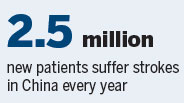Nestle Health Science announced it and the Chinese Stroke Association signed an agreement on March 30 to jointly improve the screening, diagnosis and management of dysphagia - defined as difficulty in swallowing, caused by obstruction or spasms in the oesophagus - amongst stroke patients in the country.
It is estimated that between 3.4 and 7.4 million patients suffer from dysphagia in China. Stroke is one of the most common causes of dysphagia, leaving patients vulnerable to dehydration, malnutrition and aspiration pneumonia.
Nestle Health Science, a unit of the Swiss based international food group, said it would work and share resources with the Chinese Stroke Association on the introduction of clinical innovation and best practice standards in the mainland's leading stroke centers.
For non-hospitalized patients, Nestle also launched an easy eating telephone hotline on 4007000787.
As part of the initiative, Nestle Health Science will distribute a thickening agent called Thicken Up - that enables food and liquids textures to be modified to help patients overcome difficulties in swallowing - to leading hospitals in 25 provinces and municipalities in China.
Every year in China about 2.5 million new patients suffer strokes, with 30-65 percent of them suffering from dysphagia, adding to the workloads in hospitals.
"In recent years, the number of stroke patients has increased every year," said Zhang Zhuo, secretary-general of the CSA.

Zhang said it was important to strengthen the development of easy access to the treatment of strokes. But more attention to addressing the management of important stroke complications - including dysphagia - was also important, he added.
Patients suffering from dysphagia after a stroke have difficulties in drinking and eating and find it hard to return to the dining table at home, causing major psychological pressure and even depression.
The initiative between Nestle and the association is part of a wider advance in medical care in the mainland, said Cecily Gu, regional business head of Nestle Health Science in China.
"In the last two decades we have seen a clear evolution in the medical approach in China," Gu added. She said the emphasis had moved beyond addressing survival from strokes, to improving the quality of life, especially the quality of life and mental health in the rehabilitation process.
Greg Behar, CEO of Nestle Health Science, said: "We are actively developing innovative nutritional therapies for conditions like dysphagia, with the goal of improving patients' quality of life."
wangzhuoqiong@chinadaily.com.cn
(China Daily 04/13/2017 page18)
